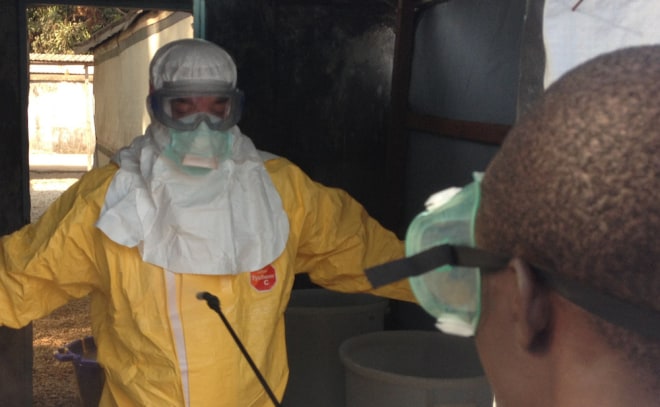
EU Humanitarian Aid and Civil Protection (CC) on Flickr
You might have missed it, because we’re barely talking about it in the United States, but the African Ebola epidemic has still not died down: the World Health Organization identified 99 new cases in its most recent status report. And as long as the disease persists, the possibility exists that it could spread back out of that confined area to other countries. Which makes it a good time to consider several new reports of what happened to US health care workers involved in responding to Ebola, and how that experience still affects their lives.
Short version: Of two who contracted Ebola and survived, one remains ill and fears she was manipulated, and the other, though well, feels he was misrepresented and stigmatized. Both worry their experience will dissuade others from volunteering in turn. And a major new government report backs them up.
The Dallas Morning News reported Saturday on Nina Pham, one of two nurses infected by Thomas Eric Duncan, a Liberian who flew into the United States not knowing he had Ebola. After developing the disease and being treated by her own hospital, Pham was flown to the Clinical Center at the National Institutes of Health, where she was treated with experimental drugs and the blood serum of US physician Kent Brantly, who had already recovered. (Her colleague Amber Vinson got similar treatment at Emory University.) Pham survived and returned home, but months later, she struggles with liver disorders, insomnia, hair loss, what sounds like post-traumatic shock, and an uncertain medical future.
Pham is suing the hospital where she worked and was treated, Texas Health Presbyterian, for putting its staff at risk. From the story by Jennifer Emily:
Pham says she will file a lawsuit Monday in Dallas County against Texas Health Resources alleging that while she became the American face of the fight against the disease, the hospital’s lack of training and proper equipment and violations of her privacy made her “a symbol of corporate neglect — a casualty of a hospital system’s failure to prepare for a known and impending medical crisis.”
Pham wants unspecified damages for physical pain and mental anguish, medical expenses and loss of future earnings. But she said that she wants to “make hospitals and big corporations realize that nurses and health care workers, especially frontline people, are important. And we don’t want nurses to start turning into patients.”
A few days before that story, another US health care workers who treated victims of the diseases and then developed Ebola published his own account. Dr. Craig Spencer was healthy when he flew home to Manhattan; as requested by the Centers for Disease Control and Prevention, he took his temperature twice a day, looking for any spike that would indicate he was developing symptoms and becoming infectious. On the day his temperature rose, he checked himself into Bellevue Hospital. He writes in the New England Journal of Medicine:
People fear the unknown, and fear in measured doses can be therapeutic and inform rational responses, but in excess, it fosters poor decision making that can be harmful. After my diagnosis, the media and politicians could have educated the public about Ebola. Instead, they spent hours retracing my steps through New York and debating whether Ebola can be transmitted through a bowling ball. Little attention was devoted to the fact that the science of disease transmission and the experience in previous Ebola outbreaks suggested that it was nearly impossible for me to have transmitted the virus before I had a fever. The media sold hype with flashy headlines — “Ebola: `The ISIS of Biological Agents?’”; “Nurses in safety gear got Ebola, why wouldn’t you?”; “Ebola in the air? A nightmare that could happen” — and fabricated stories about my personal life and the threat I posed to public health, abdicating their responsibility for informing public opinion and influencing public policy.
Spencer was hospitalized for two weeks; his recovery rendered the US Ebola-free. (Kaci Hickox, who shortly afterward was forcibly quarantined in a tent by New Jersey Governor Chris Christie, never had Ebola.) He worries though that his experience will deter other health care workers from volunteering where they are needed:
My U.S. colleagues who have returned home from battling Ebola have been treated as pariahs. I believe we send the wrong message by imposing a 21-day waiting period before they can transition from public health hazard to hero. As a society, we recognize the need for some of our best-trained physicians and public health professionals to participate in a potentially fatal mission because failing to stop the epidemic at its source threatens everyone. We should also have faith that these professionals will follow proven, science-based protocols and protect their loved ones by monitoring themselves. It worked for me, and it has worked for hundreds of my colleagues who have returned from this and past Ebola outbreaks without infecting anyone.
Spencer’s frustration is echoed in a report released last week by the Presidential Commission for the Study of Bioethical Issues, which examines the arguments for quarantine (and other ethics-based issues such as whether to send help to affected countries and how to conduct clinical trials of treatments). The commission, composed of medical and legal faculty from 11 universities, comes down strongly against imposing quarantines on people such as Spencer who are not infectious, and in favor of extending more support to health care workers such as Pham.
In releasing the report, he Commission’s chair, Amy Gutmann, PhD, president of the University of Pennsylvania, expressed its conclusions forcefully:
Public health preparedness requires ethics preparedness. We need to be prepared, for example, to communicate early and often during an Ebola epidemic — drawing upon the best scientific evidence — why not to quarantine asymptomatic individuals. Needlessly restricting the freedom of expert and caring health care workers is both morally wrong and counterproductive; it will do more to lose than to save lives.